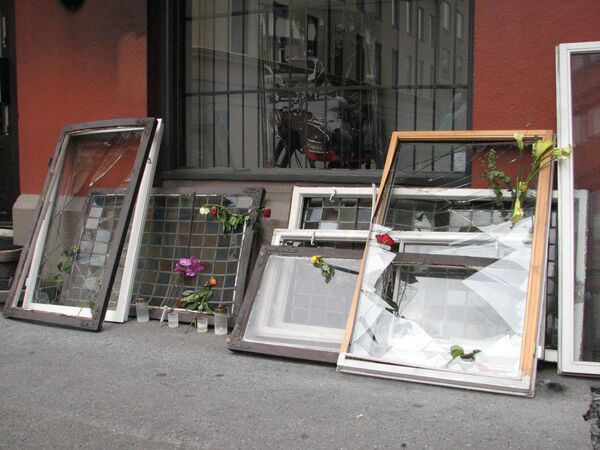The streets surrounding the site of last Friday’s terrorist car bombing in Oslo have resembled a ghost town for the last few days, with windows boarded up and signs on many saying they are currently closed for business.
Yet as the police barricades cordoning off the area of the explosion have been lifted, shop owners have set to the task of repairing their stores. Glaziers were busy today installing massive windows on Mollergala street just a block from the explosion and many businesses have begun opening their still boarded-up doors again for business.
Abdallah Mazraani owns a small kebab shop on Skraniga street, which sits behind the government building targeted by the attack. The glass has been cleaned out of the inside of the shop, but large holes remain in the ceiling where parts of the building caved in. Large wooden planks and a Norwegian flag hanging in front have taken the place of glass windows for the time being.
“The pressure came in through the shop, and the windows blew outwards,” Mazraani remembered. “All of us were thrown backwards. We had one man sitting by the window, he was cut by falling glass.”
“We had six kids in here when the windows blew in,” said Birk Tysnes, a manager at Gameworks toy store located just behind the government building around 50 meters from the blast. “I was thrown over a table and a cabinet fell over on me. There were dead people and others using sweaters to try to stop the bleeding outside. I got the cabinet off me and got the kids out. Luckily no one inside was hurt.”
Tysnes said he had spent several days cleaning debris out of the shop, which had opened up for the first time since Friday.
Oslo has remained on edge since Anders Breivik’s car bomb tore into the prime minister’s offices in the heart of the country’s capital last Friday. Just this morning, Oslo Central Station was closed when a suspicious suitcase was discovered, raising fears of a possible copycat attack. Police investigated the station and later pronounced it a false alarm.
At KrosbyMobler, an Oslo furniture shop that has been located in the center for more than 100 years, the glass and debris covering the floor were only part of the problem. Shards of metal from the prime minister’s offices had been strewn across the roof in the aftermath of the bombing, and there were concerns about the building’s structural integrity.
“The glass is going to come at some point, we know that. But here, the façade is broken, and how long it could take to fix that, who knows,” said Asla Sorrland, a manager at the shop for more than five years. The shop, which had opened up for the first time that day, had to close again after police said the building was not safe.
Lost revenues were also taking a toll on businesses. “We ran out, all of us, and we had to leave all the kebab and everything behind, which we then had to throw out,” said Abdullah. “Over the weekend, on our busiest days, we lost about 90,000 kron ($14,420). I am going to have to go deep into my savings to not close up.” Sorrland said that the Krosby Mobler had lost 100,000 kron ($16,023) on Saturday alone, usually the store’s busiest day.
Luring customers into the area, which is currently only accessible from areas further from the blast, was also a concern. “I haven’t seen any of my regular customers since the blast,” said Mazrani. “We’ve had some people from outside in here, but I’m hoping that business will pick up as time moves on.”
“To be honest, there’s no time to think about the money,” said Tynes. “I’ve been playing these games for 15 years and this is my hobby. Since the attack we’ve had plenty of support on Facebook from people worried about the shop closing down. It feels great to be open again.”


